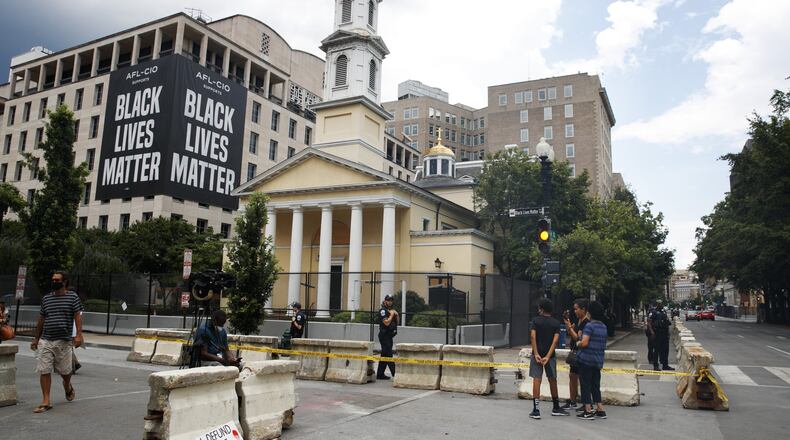The French Revolution saw the great prayer houses of the nation turned to munitions dumps, their glorious statuaries turned to shooting targets. Rent from vast land holdings, in addition to the tithe, had provided great income to the Catholic Church for centuries, making of it a ripe subject for revolutionary pillage, along with the rest of the establishment.
Our recent reduction of American symbols has not directly implicated religion. As children of the Enlightenment, the Founding Fathers wisely broke with Europe by disallowing the establishment of any one belief by the government. Thankfully, religious conflict does not figure highly in our past causes of national bloodshed – we’ve avoided the lengthy horrors of the Thirty Years’ War.
So where does religion figure now? The deluge of recent information has been eerily silent on that topic.
The majority of Americans would likely identify as White Christians on paper, predominantly in the South and Midwest, but also prevalently in cities like New York City and Los Angeles. Everyone has private convictions, most certainly today, but where do we as white believers stand?
We are first and foremost aware of what our ancestors did, enslaving an entire race of men and driving Native Americans into confinement, in the name of progress and civilization. We grew up in homes and communities implicitly biased against non-white people; we ourselves continue to remark upon the shortcomings of non-white people in moments of frustration. We’ve tried mightily to overcome our past, and we’ve often failed. We stand guilty, with no adequate response.
We know it is not our time to shine – sufficient numbers of our Black brothers and sisters, most of those in the same working and professional classes as ourselves, are speaking, and we support them in spirit, if not perhaps on the front lines of a protest. We supported the recent Bostock v. Clayton County decision, holding against a neighboring county here in Georgia that the Civil Rights Act applies to gay and transgender employees. We supported the Supreme Court again when it found insufficient justification to terminate DACA. These decisions embody Christian values of inclusion. We believe law and order should reflect modern circumstances, as we know that our gay sons and daughters come from conservative households too and that our homes are constructed largely using Hispanic labor who brought their families here for a better life.
We believe spirituality to be universal and other religions to be equally valid, beginning with that of the Jews, “our elder brothers in the faith of Abraham” according to John Paul II, whose scriptures form the first portion of the Bible. We are well aware of the cruelties inflicted by Christian zealots, but we submit that the inflictors were Christian in label only, always bent on advancing their own power, and that they went down to categoric defeat.
On that topic, we are appalled by nationalist tendencies attempting to link our country’s success unconditionally with the will of God. This attitude brooks little rational thinking, and we know that being the greatest nation does not make us invulnerable to history. We believers are routinely attacked by our angered peers and family members for being pacifists and sellouts, when we are no such thing. It is a dilemma for the ages – we are often quiet to maintain civility in our own homes, whether that is correct or not.
We reject violence as a solution, but we acknowledge its possibility – we aren’t delusional. Christ said, “Think not that I came to send peace on earth; I did not come to bring peace, but a sword.” We support neither anarchy nor tyranny. If tearing down all offensive monuments would save one life we would be in favor, but we know that true justice results when impediments are removed in the heart. Neither are we deceived by any Bible raised aloft to sanctify violence against our own people – such violence would have catastrophic consequences on our system of government.
Finally, we believe in individual responsibility to acknowledge sin, because that’s the only way forward. We can turn no more of a blind eye towards our poor Black brothers carelessly victimizing one another in the city than towards our poor White brothers stealing and overdosing in the backcountry for lack of hope. Clearly, corporate platitudes cannot repair these problems – we are capitalists, but we believe foremost in the doctrine of repentance, where fallen people must examine and improve their own lives, despite their level of wealth – there is no hiding in a group forever.
We White Christians are quiet because we don’t know what to say right now. We may not be the majority in belief, but we will never stop believing that vigilance and longsuffering will win the day. God shows no partiality – of this we are certain.
Douglas Ford, of Cobb County, is a commercial litigation and criminal defense attorney.
About the Author
Keep Reading
The Latest
Featured


